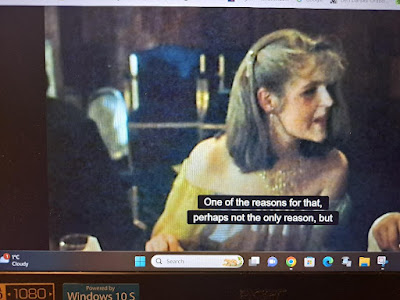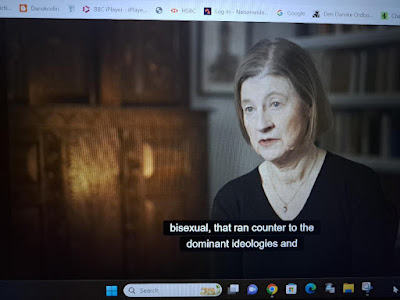Well, today is the day that Lois and I, after 5 days, escape the freezing cold of the crumbling Victorian mansion in Hampshire owned by our daughter Alison and husband Ed and go back to our hopefully toasty new-build home in Malvern. Heat beckons, and we cannot, nay we dare not, refuse - my goodness no!
It's been great to have our 3 grandchildren's company as we "teen-sat" them for Ali and Ed who were spending a couple of days with friends in Berlin. However Lois and I are definitely now beginning to feel the strain of not only being "on duty", but also the strain of not being able to relax or do anything very much, because of the need to find somewhere warm to be - either in bed, or sitting virtually on top of a "space-heater" - the problem is that the "spaces" here are far too big, ridiculously big - vast cavernous rooms with draughty doors and windows, and huge tall curtains that don't quite meet.
Oh and I almost forgot: unfortunately the central heating system here broke down, and did so almost at the same time as Ali and Ed jetted off to Berlin from London Gatwick on Saturday morning.
Brrrrrrrr!!!!!
Lois seen here with 2 of the 3 grandchildren we have been
"teen-sitting" - Isaac (13) and Rosalind (15)
flashback to the weekend, central heating broken down,
and recourse to blankets, dressing gowns and
hot-water-bottles: what a madness it all was!!!
09:30 We say goodbye and start off on our 123-mile journey back home to Malvern. I'm sorry to say that this will be no simple task because Lois and I are 77 - we've lived longish lives already, and we virtually gave up driving anywhere much during the pandemic, so we're not used to doing long journeys.
Yes, you know what it's like when you're old and you realise you've become an object of curiosity.
One of our grandchildren, Rosalind (15), is a history buff, and over the weekend, she asked us, with obvious awe, to name some of the "historic" events we've lived through: we tell her we remember George VI dying in 1952 and Elizabeth II being crowned in 1953, the first satellites with dogs and monkeys going up in them in the 1950's, Telstar beaming the first pictures from across the Atlantic in 1962, and watching the first moon landing in 1969 - you know the kind of thing!
Oh how ancient we must seem to her haha !!!!!
Anyway even though we're terribly ancient, we make it back to Malvern in just under 3 hours, without stopping, so that's all good.
12:30 We get home, and the house feels instantly warm to us, even though the central heating, in our absence, has only been on whenever the temperature fell below 60F (15.5C). After lunch we spend the afternoon in bed anyway - well, wouldn't you, if you had the chance? Be honest !!!!
16:00 Before we get out of bed, I check the local news on my smartphone, and I see nothing much has been happening in the county over the weekend. As people round here always say, "Nothing ever happens in Worcestershire!"
some typical pub conversations in Worcestershire
The big story at the moment seems to be complaints about "poor lighting" in Worcester's darkest "dogging car park".
And from the comments, I can't tell exactly who's complaining about this alleged "poor lighting" in this dogging car park. Is it the neighbours, is it the couples, or is it the "doggers", who are complaining? I think we should be told, don't you, and by somebody authoritative from the county council for preference!
What a crazy county we live in !!!!!
21:00 We go to bed on an interesting documentary, the first in a series of 3, all about the gothic themes of "darkness, emotion, romance, mystery and menace" on the Sky Arts Channel. The perfect programme to go to bed on, when you think about it.
A fascinating programme, because as some of tonight's academic pundits make clear, "Nothing is fixed in the Gothic. So from the earliest definitions of "Gothic" in 18th century culture, you see the concept of it being a world of imagination that you can't quite pin down".
And a crucial distinction is made early on in the programme, sort of broadly distinguishing the comfortably-off male writers of gothic, who dealt in horror and more kind of physical threats, and the women gothic writers, who were living sometimes terrible lives personally, and who, in their fiction, dealt more in terror than in horror, especially terror of the psychological kind.
On the male side we hear a lot, for example, about Bram Stoker, writer of "Dracula" and, from the 20th century a lot about Arthur Conan Doyle with his "Hound of the Baskervilles" and the general darkness of the Sherlock Holmes character that he created.
On the female side we hear a lot about the Bronte sisters, and then among later writers, a lot about Mary Shelley who wrote Frankenstein, and from the 20th century, Daphne du Maurier, writer of "Rebecca".
the Bronte sisters
In contrast to the male writers, many of these women writers lived lives of incredible pain, right from their earliest childhood, being beaten physically, or tortured psychologically, by the men in their lives: fathers, then schoolmasters and then husbands. The Bronte sisters were "schooled" by a sadistic schoolmaster. And among the more modern writers, Mary Shelley was treated cruelly by her father, and Daphne du Maurier lived in an unhappy marriage with an unfaithful husband.
Patriarchy was the universal order of the day, particularly in the 19th century, when women were believed to be dangerously passionate creatures who had to have their "libidinistic" tendencies beaten out of them by the men "responsible for them". What a crazy world it was.
The women writers, however, like the Bronte sisters for example, seemed to find some release from the trauma of their lives through their writing, just like, as children they had been able to get away from their home and their father by wandering over the Yorkshire moors.
And in the 20th century, Daphne du Maurier's "Rebecca" picks up on many of the Bronte sisters' themes. Rebecca, employed by the sophisticated "Mr de Winter", in the vast mansion that is "Manderley", has echoes of Jane Eyre in Thornfield Hall with her employer "Mr Rochester".
In "Rebecca", du Maurier picks up on these kinds of literary traditions.
Their homes became almost like prisons for many of the women in these stories. It's interesting that in quite a few of gothic novels, including "Jane Eyre" and "Rebecca", we see the hated family house finally burning down.
Fascinating stuff!!! And we look forward, with anticipation, to the next programme in the series.
22:00 We go to bed - zzzzzzzzz!!!!
















































